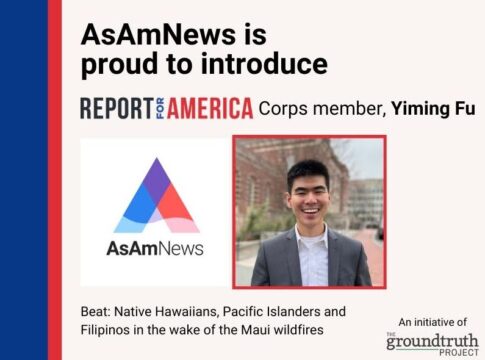
Views From The Edge
By Ed Diokno
It took a Donald Trump for Asian Americans to snap out of their political slumber. As a result, a record number of Asian American Pacific Islander (AAPI) candidates will be testing the political waters this year.
“I’m a registered Democrat,” said Andrew Janz, a Thai American running in California’s 22nd Congressional District. “In 2016, at the end of the year, I’m sort of looking around to see what I can do to make sure that there is never a Trump presidency again. Just trying to figure out what I could do from my position as somebody who’s semi-active in the community.”
The 34-year-old deputy district attorney is running for Congress because, well, Trump. “I think Donald Trump doesn’t have the moral character to be president of the United States,” he said. In California’s Central Valley, he’s taking on Rep. Devin Nunes, chair of the U.S. House Permanent Select Committee on Intelligence and Trump’s chief defender against charges of Russian influence in the U.S. political system.
Varun Nikore, the president of AAPI Victory Fund, said there is a record number of Asian American Pacific Islander candidates running for Congress this year, with as many as 59 potentially on the ballot in 2018. Many of them are in swing and high-priority districts gaining national attention ahead of the 2020 presidential election.
LATEST STORIES
Nationwide, there are over 220 progressive AAPI candidates running for elected office on the federal, state, and local level in 32 states—including nine gubernatorial candidates.
Already, AAPI candidates have won elections in Virginia and New Jersey, hinting at the start of what could become a historic political change.

Most of them are first-timers like Dave Min of Orange County, California. For Min, Trump’s travel ban was a wake-up call. The law professor and former Washington, D.C. political hand had never seriously considered running for office and had no real organization behind him. But as the son of two Korean immigrants, Min felt that Trump’s decision to temporarily suspend immigration from some predominantly Muslim countries “was a huge slap in the face.”
“It felt very personal being the son of immigrants myself to feel like this country was going to single out people based on their country of origin and their religion,” Min told CNN in an interview.
The decision to take the plunge into politics is not an easy one. “Last fall, I was coaching soccer and barbecuing every chance I could get — I was a total dad,” he said. “But on the other hand, the stakes are so high. The soul of America is at stake right now.”
Some criticize Asian Americans for not being as politically active as other ethnic groups. That could be attributed to the fact that a large segment of the AAPI community is first-generation immigrants, still trying to establish themselves economically and socially.
Compared to Latino and African American voters, AAPIs just don’t turn out to vote, according to AAPI Data. In the 2016 elections, voting rates among Asian American adult citizens remained low (49%) relative to Whites and Blacks (65.3% and 59.4%, respectively) and was slightly higher than voting among Latinos (47.6%).
The good news is that voter registration among AAPIs has spurted tremendously since 2012. But, getting the newly registered voters to the polls has proven more difficult. A lot of that is the lack of contact from the major political entities. AAPI voters were the least contacted by the Democrats and the Republicans out of the different ethnic voter groups.
Nevertheless, as a result of the voter registration drives by various entities in the AAPI community, the 2016 Presidential election saw a record increase in voting for Asian Americans. Between 2012 and 2016, about 1.14 million new Asian American voters entered the electorate, nearly double the average increase of 620,000 new voters in the prior three presidential cycles.

Growing up in the South Jersey burbs of Philadelphia, Andy Kim remembers a district full of farmland and cranberry bogs. The area has grown up, though, as have communities of color, from Koreans like himself to Chinese, Thai, and Filipino transplants.
“There is nothing I’d rather do than serve my country. I believe that service isn’t just a job, it is a way of life. I dedicated my entire career to serving the American people,” he says on his website. “I worked at the White House on countering terrorism and protecting our country, advised the Secretary of Defense and the Pentagon on national security, and I served in Afghanistan as a strategic adviser to Generals David Petraeus and John Allen. When I served in Afghanistan, no one asked me if I was a Democrat or a Republican. We all worked together focused on the mission of keeping our nation safe.”
For years, Kim was content with staying in the background as a member of the Obama White House. In 2015 he left the White House, and the following year he left government altogether.
After Trump’s election, Kim collaborated with other Obama alumni to increase citizen engagement to build the resistance—then took his own advice. He’s been embraced by national Democrats as the best shot to capture New Jersey’s 3rd District, despite nonpartisan analysts predicting it would likely remain in GOP hands—though the health care debacle could make an impact.
After several self-effacing years working behind the scenes, Kim is still learning how to play by the rough-and-tumble rules of American politics and how to talk about one’s accomplishments and vision but not appear being boastful. But to Kim, it’s all part of being a public servant, running headlong toward the next crisis.
Last fall, around Thanksgiving, when Kim was speaking at the First Korean United Methodist Church for the Chuseok Festival, he remembers feeling like he had come full circle—delivering a speech as a congressional candidate just down the street from his childhood home. “Minority populations writ large understand the importance of diversity of voices in leadership,” he says.
Since the start of the 21st century, Asian Americans have been the fastest growing ethnic group in the U.S.Nationwide, they grew 46% between 2000 and 2010. Excluding Hawaii, the Asian American population grew at least 30% in every single state in that ten-year span alone. In California alone, nearly 16% of the approximately 38.5 million people are Asian Americans.
Beyond voting, getting AAPIs to run for office has traditionally been difficult. Politics is not the career choice most AAPI parents would prefer for their children. And AAPI candidates need to overcome the stereotype of being quiet and not being aggressive.
But that’s changing, says Christine Chen, executive director of the outreach nonprofit Asian and Pacific Islander American Vote. AAPI women pushed the number of AAPIs in Congress in 2016 to 18: including the first Thai American, Tammy Duckworth, elected to the Senate; the first Vietnamese American woman to Congress, Florida’s Stephanie Murphy; and the first Indian American women elected to both the House, Pramila Jayapal of Washington, and Senate, Kamala Harris of California.
For the 2018 Midterms, when more than 2,100 people have filed paperwork to run for Congress—almost twice as many candidates as in 2015, according to a study of Federal Election Commission data by The Washington Post—Asian Americans have been especially optimistic about being able to win races, and especially motivated by concerns over immigration rhetoric, anti-Muslim violence that reached new levels nationwide following Trump’s election, and the increased boldness of white supremacists.
“I’ve never seen (this) level of activism,” says Chen. “It’s just a different atmosphere.”

Dr. Mai Khanh Tran is the only woman running in the Democratic primary, hoping to replace Republican Ed Royce, who announced earlier this year that he does not plan to seek re-election.
Tran was born in Vietnam and came to the U.S. at age 9; she is now a pediatrician in Southern California. She said that on the day after the election, she didn’t want to go into work.
“But I did what most women do,” she said. “I went in to take care of my patients.”
On that day, one of her patients was a young child with a brain tumor whose family had just gotten insurance because of the Affordable Care Act. With Republicans in control of Washington, the family could lose that coverage.
After Election Day, Tran began to speak publicly about the need to protect the Affordable Care Act, but when she saw Royce vote to repeal it, she began to be able to see herself in Congress.
“It was really the vote that was in Congress by our representative that showed me the need for someone like me, a mom, a fierce mom, a dedicated doctor, to really run for Congress,” Tran told CNN.
Since announcing her campaign in a district that Clinton won by 9 points in 2016, Tran has secured the backing of groups like AAPI Victory Fund and EMILY’s List, among others.
There are many reasons that certain issues would seem to signal Asian American support for conservatism, from their entrepreneurial mindset to a focus on faith and family, argues Joel Kotkin, an internationally recognized authority on global, economic, political, and social trends.Since 2000, AAPI voters have been moving leftward towards the Democrats. By the 2016 elections marked by anti-immigrant rhetoric, AAPI voters cast their ballots for Hillary Clinton in overwhelming numbers. The shift is part of a larger trend across diverse communities in the age of Trump.
“This goes beyond Asian-Americans to middle-class Hispanics to a large part of white middle-class voters, who in many ways have much reason to be suspicious of the Democrats but are viscerally turned off by the Republicans,” says Kotkin. “In very tight races, it could cost Republicans several seats.”
Perhaps in no other state will the political awakening of AAPI communities have a greater impact than in California. Voters will find at least a dozen Asian Americans contending for office in the June primary election, including state treasurer John Chiang, who is running for governor; state controller Betty Yee, who is seeking re-election; and California Board of Equalization member Fiona Ma, who is running for state treasurer.
The number of candidates has prompted the Los Angeles-based nonprofit Center for Asian Americans United For Self Empowerment (CAUSE) to organize what it calls the first ever AAPI-focused gubernatorial debate in the state’s history, scheduled for April 27. The event is the largest in a series of debates the group is planning as part of its voter engagement initiatives.
Just within the last three election cycles, there has been a growth of over 600,000 new Asian American voters nationwide. These new generations of Asian Americans can lead to increased voter activity since they are more likely to be proficient in English and will not require assistance in translating, unlike their parents. It is now more important than ever that Asian Americans become more politically involved due to their rising population growth rates.
“I think for us … 2018 really felt like an opportunity to leverage the community to get out there and vote,” said Kim Yamasaki, CAUSE’s executive director.
AsAmNews has Asian America in its heart. We’re an all-volunteer effort of dedicated staff and interns. Check out our Twitter feed and Facebook page for more content. Please consider interning, joining our staff or submitting a story.







